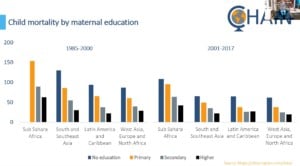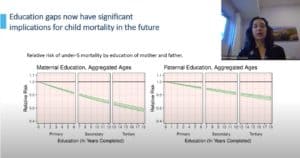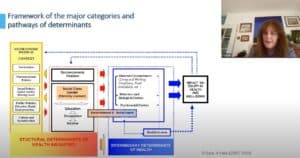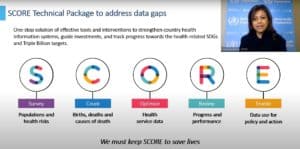How is data changing health inequalities research, and how does it interact with policy? The Centre for Global Health Inequalities Research (CHAIN) brought global thought leaders together to discuss these topics.
Written by Katharina Yacoub

Centre for Global Health Inequalities Research (CHAIN)
CHAIN is the leading centre and interdisciplinary research network for global health inequalities. It brings together expert researchers in the field of health and the social determinants of health with representatives of civil society and the UN system. The centre aims to advance health inequalities research and its use for policies and practice. As a partner in CHAIN, EuroHealthNet leads efforts to bridge gaps between research, policy and practice, and for the dissemination of results.
Diving into data

In order to fill prevailing data gaps, CHAIN seeks to create a global data and research infrastructure by mapping and collecting data in as many countries as possible. To ensure global comparability of data, CHAIN aims to set up a global health equity survey. This will combine detailed measures on health and health behaviours, living and working conditions, on healthcare utilisation, and of the social stratification system of societies. In 2014, CHAIN started this process when it was elected to add questions on social inequalities in health and the determinants of health to the European Social Survey (ESS). The ESS measures attitudes, beliefs, and behaviour patterns of people in Europe. CHAIN will work on the next round of the survey as well, the results of which are expected to be released in 2022.
Count everyone, because everyone counts
“Health for all cannot be achieved if we do not know who we are leaving behind. And we are leaving many behind, particularly those in the most vulnerable settings”.
COVID-19 has not only uncovered long-standing social and economic problems and exacerbated inequalities, but also seriously threatens progress towards the Sustainable Development Goals (SDGs) explained Dr. Samira Asma, from the WHO’s Division of Data, Analytics and Delivery at the 2020 World Congress on Public Health. She stressed the importance of data to help overcome these challenges.
Many countries are still unable to accurately report on the most basic health information such as number and causes of deaths. Globally 1 billion people are invisible because they do not have a birth certificate or die without a death certificate. Yet data on these factors alone informs at least 12 of the 17 SDGs. Around 50% of countries have primary data for less than half of the health-related SDG indicators.
To tackle these issues, the WHO put forward the SCORE technical package. The package represents key elements that are necessary to strengthen countries’ data and health information systems:
-
Dr Asma sets out the SCORE Technical Package Survey: improving surveys on population and health risks
- Count: improving civil registration of vital statistics
- Optimise: optimizing health and service data
- Review: reviewing progress and performance
- Enable: using data to inform policies and deliver action
The tools to strengthen information systems are already available and should be put into use as soon as possible. Collecting data takes political and financial commitment, timely, reliable and accurate data is necessary for effective policies and programs effectively.
Adding educations as a risk factor in the Global Burden of Disease study

The Institute for Health Metrics and Evaluation (IHME) and CHAIN collaborate on including education as a risk factor in the Global Burden of Disease (GBD) study. According to professor of health metrics sciences Dr. Emmanuela Gakidou, it is not enough to just quantify what kills people or what makes them sick. It is also important to quantify the contribution of other factors, such as social determinants, to inform effective policies.
Education is closely linked to health. For instance, for every additional year of parental education, particularly maternal education, the relative risk of a child dying within the first five years decreases. Therefore, investing in education, particularly for girls is essential.
Progress towards SDG4 on education has been made all over the world: gaps that were observed a few decades ago are narrowing, predominantly for primary education. Now is the time to focus on narrowing gaps in secondary and tertiary education as well, to ensure equity on all levels within the next decade. Persistent gender gaps in education in south Asia, sub-Saharan Africa, North Africa and the Middle East need to be addressed. These regions are projected to lag behind in the coming decades.
Combining insight of social determinants and the power of data to inform decision making

Salma Abdalla from the Boston University 3-D Commission explained how the COVID-19 pandemic has shown the power of data in shaping population health. She also depicted how it can inform decision making for the future. The course of the COVID-19 pandemic in the USA demonstrated implications of failure to use data on social determinants of health for decision-making. The substantial mismatch between the impact of health determinants and healthcare spending leads to increased healthcare and social security costs.
Data inequalities exist in a large scale across the globe, thus practical solutions must be found for different contexts. The 3-D Commission aims to create a lens on the determinants of health and data, rather than providing concrete actions. This should help decision makers find the solutions specific to their region’s context.
Lessons from WHO’s work on the social determinants of health equity

Nicole Valentine from the WHO walked the audience through the main developments that put social determinants on the WHO agenda. Social determinants have a direct impact on health (daily living and working), predict the greatest proportion of health status variance (health inequity), and structure (health) behaviours. The WHO started off by creating a framework of the major categories and pathways of determinants. Based on this they went on to develop a basic causation model and indicators of social determinants of health. As part of the EQuAL project – funded by the WHO and the Rockefeller Foundation – , domains, subdomains, and recommendations for these determinants were established.
However, there are still many gaps in evidence on many indicators of social determinants of health. The agenda for addressing health inequalities can only be moved forward when the impact of determinants is made concrete through data.
The future
Evidence-driven surveillance of socio-economic inequalities on a global scale is needed. While we are heading in the right direction, better data is necessary. Data collection must be improved through collaboration with other sectors, integrating more indicators in health surveys, and using geospatial data. Moreover, global comparability of data must be ensured, requiring improved research infrastructures with a comparative scope.
Watch the CHAIN World Leadership Dialogue below. The slides used by the speakers are available here.


